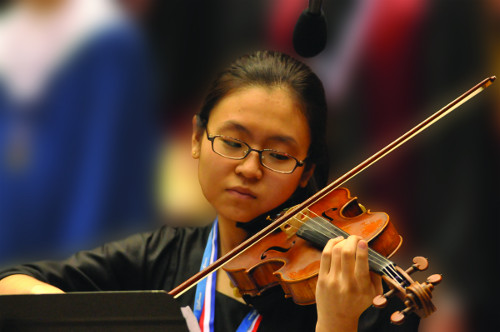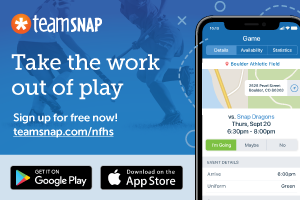The Value of Solo and Ensemble Festivals within a Total Music Program
By Mike Plunkett on October 13, 2015 hst Print
Some music directors have been reluctant to involve their students in regional or state solo and ensemble festivals. In addition to the personal time commitment, some administrators question any time that students are away from the classroom, and require teachers to justify and quantify anything new experienced outside the normal school day – even though that new opportunity is well within the curriculum of the course being offered.
However, in the “big picture” of an overall music program, solo and ensemble festivals are definitely worth the music educator’s additional commitment and effort, and the administrator’s approval and support as a valuable and educational reason for students to be away from the classroom.
The impact – both musically and educationally – to the “concert” group experience becomes very apparent when a large number of the ensemble members are also participating in solo and ensemble festivals as individuals or in small groups. From the outset, that participation requires students to spend more time practicing and working on mastering their instrument or voice. It provides them with motivation to practice outside the classroom and go beyond their ensemble music’s challenges and focus.
However, possibly the most striking improvement shown by solo and ensemble festival participants in their large ensemble experiences is their confidence. Now more aware of their capabilities, more comfortable with their musical skills and better able to read and interpret music, these students now not only contribute greatly to the overall musical effect of their ensemble, but provide motivation and leadership for the other participants.
Every musician in a school music program benefits from the solo and ensemble festival opportunity, whether he or she is a direct participant or not, through the notable improvement in the musicality and skill level of the ensembles. Better musicians provide the opportunity for everyone to get better. Preparing solos for these festivals may also help students to obtain a music scholarship, either locally or for a potential higher education institution where the ability to perform a challenging piece of music as a solo in an audition setting is required.
As an added benefit of the festival performances, the small ensembles can perform at a school concert or assembly, providing yet another musical experience for the students, a performance experience for the community and a valued celebration of the school’s quality music education being offered to all students.
Soloists and small ensembles, with their piece prepared for festival, can then perform at local events, senior citizen homes and the meetings of community-based organizations. Each of those mini-concerts expands the students’ musical experiences and expression while reaching out to the community that supports them in their educational pursuits. Part of the responsibility of educators and administrators is to prepare the student for the next level of participation – musically, educationally and as good citizens in the community.
Following are some examples of why successful music teachers and directors participate in solo and ensemble festivals, and why all schools should consider including them as well in their students’ already busy schedules:
- • Solo and ensemble festivals require students to be responsible for their own parts, which rarely occurs in large concert ensembles. They cannot hide in a trio, when they are the only one assigned to that particular part. Ensembles teach “teamwork” in that each member has a responsibility to the other ensemble members. Solos and ensembles teach personal responsibility.
- Solo and ensemble festival participation creates an avenue to a vast array of quality literature from many musical periods, which is not available for their ensemble group. Additionally, this literature is introduced in a more intimate manner, allowing the student to consider the composer’s intent, examine the structure of the piece, view it in its historical context and practice it with a more critical ear, listening for the interaction in the small ensemble or the shape and phrasing of the solo melody. Much more literature has been written (and continues to be written) for the solo performer or for small ensembles and chamber groups than will ever be written for large ensembles.
- In ensembles and solos, students perform without the conductor’s guidance, enhancing their ability to be more sensitive “listeners” within an ensemble, and more aware as performers, connecting directly to the composer and the music.
- Solos (and small ensembles) often lead to valuable “one on one” instruction from private teachers, which, in turn, allows for greater individual musical growth providing the confidence that makes their large ensembles so much better. Coming from their improved mastery of their instrument or voice, that confidence leads not only to their taking on leadership roles within their school music program, but extends to their increased participation and contribution to their other obligations: athletics, academics, school-based service groups, community-based groups, and their part-time employment. Once you help instill confidence in a young person, the possibilities are endless.
- The memorization of solos promotes self-discipline, as well as the ability to work with an accompanist on an individual basis. This encourages students to look at musical form and phrasing of their piece, teaching them that musical analysis and understanding is the key to successful memorization.
- Solo and ensemble festival participation also teaches the importance of presentation in a musical performance. Students learn how to introduce themselves or their group, announce their piece, and perform with expression – all of which is part of the musical experience.
- Solo and ensemble festivals, through their evaluation and adjudication processes, provide a “sharper-edged” performance environment than friends, family or the school concert can provide. These festivals encourage a student to establish and reach higher goals of accuracy, technique and musicality than informal performances, and they provide invaluable feedback for students in pursuit of those goals.
- Successful solo and ensemble festival participation is not only fun, but it also offers one of the strongest positive reinforcements to musical training available to student musicians. Just meeting and being with other like-minded student musicians is worth the effort and often more inspiring than the student’s own performance.
- Solo and ensemble festival performances can be a life-changing experience for many students – even if they don’t do well at first. Music is one of the few subjects where 70% correct is NOT acceptable. Students who participate and do not obtain the level of performance they desire return to try again thanks to the support they receive in working toward that goal, the feedback and instruction they receive from the adjudicator and their music educator, and the noticeable improvement they see and hear in themselves from the preparatory effort.
Although some may ask students if they won the festival competition, the evaluation and rating indicate the student’s musical accomplishment and improvement – not as a comparative to others. The evaluation and rating also demonstrate to the students what they must accomplish to reach their desired level of musical achievement.
Solo and ensemble festivals are a wonderful opportunity for another music educator to reinforce what the students have been hearing from their own music teachers. It is always amazing to hear a student walk out of the performance room noting a comment made by the adjudicator that their everyday teacher has been saying every day for a year. Sometimes they just need to hear it from someone else.
And while it is possible that a student could have an adverse experience to participating in a solo and ensemble festival, those can be teachable moments for lifelong skills to be handled by their music educator. Certainly, the benefits far outweigh the potential challenges or such events would not have survived for as long as there have been musicians to perform and music educators to listen and evaluate. But the true benefit to students growing individually from solo and ensemble festival participation is their development as inspiring young people, able to take on challenges, consider and meet responsibilities, provide leadership and direction, and actively contribute to all of their activities and efforts.
Mike Plunkett
Mike Plunkett is director of all fine arts activities for the Oklahoma Secondary School Activities Association. Prior to his current position, he taught instrumental and vocal music for 21 years in public schools at the high school and college levels. He also served as the chairman of the NFHS Music Committee for four years.
Most Recent Articles
- nfhs news NFHS Learning Center Unveils School Honor Roll Program
- NFHS Network Contact Information
- nfhs news Shout-out to Health-Care Workers and State High School Associations
- state news Stadiums Across Colorado Light Up to Show Support for Students
- gymnastics-girls article ‘They became a family’: How New Castle gymnastics qualified for state for first time since 2002



